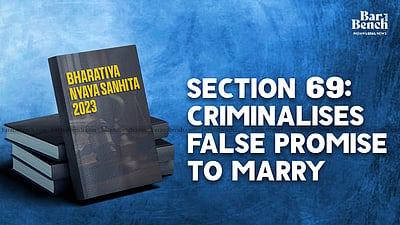September 4, 2023
The Controversial Clause 69 in the Bharatiya Nyaya Sanhita, 2023
The Controversial Clause 69 in the Bharatiya Nyaya Sanhita, 2023: Examining the Complexities of Criminalizing Broken Promises in Intimate Relationships

Introduction:
- The proposed introduction of Clause 69 in the Bharatiya Nyaya Sanhita, 2023, has ignited a heated debate regarding the role of criminal law in regulating intimate relationships.
Core Idea:
- The Bharatiya Nyaya Sanhita of 2023 presents an intriguing Clause 69, which aims to criminalize sexual acts that hinge on unfulfilled promises of marriage. While the clause also encompasses cases of deceptive sexual encounters, its primary focus remains on situations where the foundation is a promise of marriage.
Challenges Surrounding Consent and Promise of Marriage in Indian Law:
- Historical Precedent: Traditionally, the judiciary has categorized sexual encounters involving unkept marriage promises as rape under IPC Section 375, where consent hinges on the promise.
- Continued Practice: Despite amendments in 2013 redefining consent under Section 375, courts still reference IPC Section 90, which includes consent based on “fear” or “misconception.”
- Retrospective Invalidation: Misconception involves manipulating consent through promises, and the dissolution of such assurances can retroactively nullify consent, potentially leading to rape charges.
- Distinct Offense in Clause 69:Clause 69 introduces a separate offense apart from rape, bypassing the necessity of knowledge on the part of both parties and the requirement of consent.
- Impact on Consent: Regardless of the basis of a woman’s consent, Clause 69 penalizes consensual sex if a false marriage promise is established.
Key Concerns:
- Potential Misuse: There is concern that Clause 69 might be misused when parents discover premarital sexual activity, leading to its application even when the promise is absent.
- Possible Impact: Although acquittal is possible if the woman denies the promise, arrests and legal proceedings can disrupt lives.
- Rising Misuse Trend: A significant portion of rape trials, particularly those initiated by parents or guardians, aims to restrict women’s sexual autonomy.
- Statutory Rape Charges: Parents often report women as minors in elopement cases, resulting in statutory rape charges against partners, which are subsequently dropped when age is proven.
- Unintended Rape Charges: Interestingly, rape charges arise not due to lack of consent but because of consent, highlighting paradoxical legal outcomes.
Notable Judicial Interpretations:
- Deelip Singh v. State of Bihar, 2004:This case sheds light on the nuanced approach courts take when considering consent within the context of a broken promise of marriage.
- Uday v. State of Karnataka, 2003:In this case, the court’s perspective highlights how societal norms influence the interpretation of consent in promise-to-marry scenarios.
Path Forward:
- Comprehensive Consent Education: Implement comprehensive sex education programs to emphasize consent, communication, and respect in relationships.
- Empower Women’s Agency: Promote initiatives that empower women through education, vocational training, and economic opportunities.
- Balanced Legal Reforms: Seek legal reforms that consider the complexities of relationships and ensure justice without undue victimization.
- Support Structures for Victims: Establish comprehensive support mechanisms, including counseling, legal aid, and safe spaces for individuals affected.
- Holistic Perspective on Consent: Promote a societal shift towards affirmative consent in intimate interactions.
- Dialogue and Mediation: Encourage alternative dispute resolution methods like mediation and counseling to resolve cases arising from broken promises.
Conclusion:
Clause 69 of the Bharatiya Nyaya Sanhita, 2023, prompts a profound reflection on consent, autonomy, and societal norms. True empowerment transcends narrow legal frameworks and fosters a culture valuing individual agency and choices in relationships and decisions
Daily Gist : The Hindu/Indian Express : 30 Jan 2025
January 30, 2025
Gist of editorial : the Hindu/ Indian Express/20 Jan 2025
January 20, 2025
Daily the Hindu/ Indian Express Editorial Gist: 14 Jan 2025
January 14, 2025
